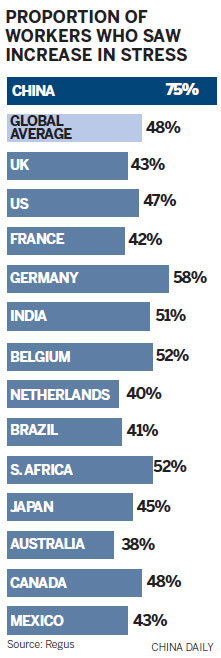
Nearly eight out of 10 Chinese workers became more stressed in the past year, a new survey has found.
The survey by Regus, a global workplace-solutions provider, recently polled more than 16,000 workers in 80 countries.
Seventy-five percent of Chinese workers polled said that their stress levels had risen in the past year, according to the survey.
|
 |
It found that 48 percent of workers globally felt growing pressure in the past year.
The smallest increases in stress worldwide were in Australia and the Netherlands, where just 38 percent and 40 percent of workers said they had experienced more stress.
Chinese workers' stress mainly comes from work, individual financial status and clients, the survey found.
In China, workers in Shanghai and Beijing felt the highest rise in stress in the past year, it said.
In Shanghai, 80 percent of workers said their stress levels rose. In Beijing, the figure is 67 percent.
Wang Fang, 34, works at a Beijing-based media organization.
"My husband and I have just bought a new apartment, and we have almost exhausted the money we have at hand for decoration, which cost about 200,000 yuan ($32,000). We will begin to pay back the housing loan next year, which is estimated to be around 10,000 yuan per month," she said.
Wang said her stress is increasing because her husband just quit his job and started his own business.
"When I am feeling stressed, I always try to talk to friends who are a long distance from me. But honestly, I am too busy to sense the mental ups and downs. I am too busy to feel them," she said.
Jiang Xue is a sales manager at a company in Wuxi that specializes in exporting advertising billboards.
Jiang said the biggest pressure she faces is from work.
"Our company has received zero orders so far this year. Sales people live on bonuses. How am I supposed to continue to live on a basic salary that is less than 2,000 yuan a month?" she sighed.
The 29-year-old said she has another source of pressure, which is more personal.
"I am feeling pressure every day as everybody around me is pushing me to get married, including my mom and dad, all the relatives, colleagues at work and even neighbors who know me well. It was nothing at first, but you will know how stressful it is if the same topic goes on and on," she said.
Hou Jianfeng, who works at a accounting firm in Shanghai that has received foreign investment, said he has decided to resign at the end of the year because of growing pressure at work.
Hou said he often works till midnight and sometimes on the weekends because his boss assigns him several projects at once.
"I'm already used to overworking, but my neck and waist sometimes ache because I have to sit in a chair for quite a long time every day and don't get to exercise," he said. "The boss wants to promote me next year, but that means I would be busier. I don't think I can hold my job until then."
A recent survey by Insight China, a State-run magazine that looks into Chinese people's welfare, showed that nearly 70 percent of Chinese are overworked and more than 40 percent spend less than 10 hours a week on leisure.
Wei Xiang, an expert in the leisure economy at Beijing International Studies University, said China's current economic development stage as a labor-intensive economy has made most Chinese people want to earn money instead of take leisure time.
Xia Xueluan, a sociologist with Peking University, said Chinese people, especially young workers, always consider how to acquire material resources as quickly as possible as the country rapidly develops.
"A booming desire for material easily transfers into stress," he said.
At a young age, Chinese are educated by teachers and parents to strive to do better than others in academic study or work, he said: "Pressure is unavoidable if one lives in such an environment," he said.
The per capita income of Chinese people is still comparatively low, and the country's social security system is yet to efficiently cover all citizens, Xia said.
"When China's social security and welfare system can efficiently benefit people, workers' stress status will change."
Li Juan, an expert at the institute of psychology under the Chinese Academy of Sciences, said stress can lead to both physical and psychological problems such as sleeplessness, anorexia and depression.
"Many people could hardly find the roots of those problems," she said.
To help relieve pressure, Li suggests spending more time on outdoor activities and improving work efficiency.
"You can think on the way to your workplace every day about how many things you have to finish today and how much time you have to finish them," she said. "Efficiently use your time, and a wise work plan will bring you less stress."
Visiting a psychiatrist is also a good way to free yourself from stress, Li said.
Contact the writers at chenxin1@chinadaily.com.cn and shijing@chinadaily.com.cn







